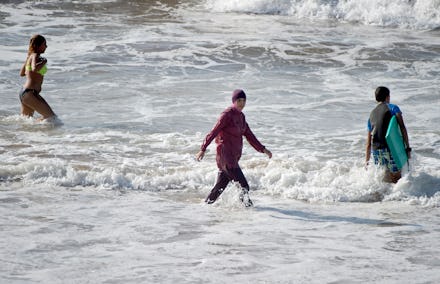Despite France's ruling against burkini bans, most mayors refuse to stop enforcing them

After France's top administrative court ruled Friday that banning burkinis is illegal, 28 of the 30 mayors across the country who have enforced the ban refuse to lift it.
The court's suspension of the ban in the town of Villeneuve-Loubet established a legal precedent for other towns to do the same. The state council, from which the suspension came, said it was a "serious and manifestly illegal violation of fundamental freedoms," the Guardian reported.
The controversial ban of the burkini — a full-body bathing suit replete with head covering designed for more conservative Muslim women — began to spread amongst cities in France in the wake of the Nice attack in July, which left more than 80 dead. The perpetrator had a Muslim name.
Human rights organizations decry the ban, arguing it is a violation of civil liberties and it is not the role of the state to mandate what women can and can't wear.
"[T]he burkini ban and the revival of the endless controversy on religious symbols linked to Islam merely stigmatize practicing Muslim women, exclude them from public spaces ... and deprive them of their rights to autonomy, to leisure activities, to wear what they chose, and of course to practice their faith," Human Rights Watch wrote on Thursday.
Many French politicians have repeatedly linked the burkini to extremist and fanatical Islam, leading many opponents of the ban to accuse the ban's proponents of Islamophobia.
"We are not talking about banning the wearing of religious symbols on the beach ... but ostentatious clothing which refers to an allegiance to terrorist movements which are at war with us," Thierry Migoule, the head of municipal services in Cannes, which instituted the ban, told Agence France-Presse.
Nicolas Sarkozy, France's former president who is currently seeking reelection has described the burkini as a "provocation," arguing it is a product of radical Islam. He's also said in his campaign, he hopes to ban headscarves in publicly owned companies and universities and to bring an end to pork-free alternative school meals, which would prevent practicing Muslim children from eating.
Last week, photographs of armed French law enforcement officers forcing a woman wearing a burkini to disrobe went viral. A law which allowed for armed-men to demand a woman take of her clothes made people across the globe deeply uncomfortable, fervently adding sexism and misogyny to arguments against the ban.
Nonetheless, politicians have found support in the ban amidst a swelling wave of right-wing populism. Furthermore, 29% of French people do not like Muslims, according to a recent poll conducted by the Pew Research Center.
In this politically charged climate, French citizens await to see how the courts will respond to mayors' refusal to comply with the burkini bans' suspension. The issue is likely to become even more messy and contentious than it has been thus far.